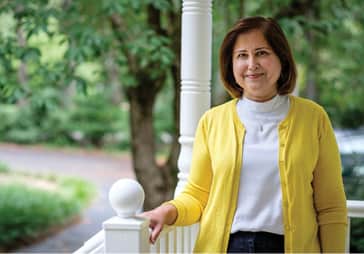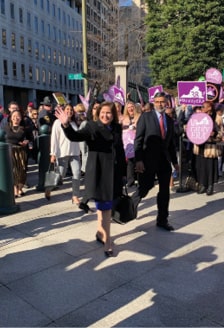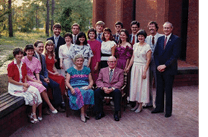Making History
Alumna and Literature Professor Wins State Election

Ghazala Hashmi (’86) comes from a family of educators and always knew she would teach.
“I think since I was 12 years old, I knew that I wanted to be a professor of English,” she said. “Both my father and mother always encouraged academics and a love of books. I grew up surrounded by books, both fiction and non-fiction, and pursuing excellence in academic work was a high priority in my family.”
For nearly 30 years, Hashmi was a literature professor or administrator at colleges and universities in Virginia. But three years ago, she faced what she called a “moment of crisis” as a Muslim American. She said she was troubled by the Trump administration’s travel ban, which blocked refugees and visitors from seven countries — five with Muslim majorities — from entering the United States. At the time, Hashmi led the Center for Excellence in Teaching and Learning at Reynolds Community College in Richmond.
“We have many folks who are from immigrant communities,” she said. “We have refugee families. We have individuals who are trying to find a foothold in this country. And this rhetoric and the policies that followed were serving to divide the communities. I felt like I needed to have a more public and visible presence and respond to these issues.”
Taking The Leap
So, the career educator made the decision to run for public office. On Election Day last November, Hashmi made history in her community. She became the first Muslim woman elected to the Virginia State Senate. Her victory helped Democrats in Virginia take control of both legislative chambers for the first time in a generation. She unseated an incumbent to represent the state’s 10th Senate District, which includes a part of Richmond and suburbs west and south of the capital city.
“I had a wide network of friends and people that I have known for many decades,” said the married mother of two adult daughters. “And I think the message that resonated is that we can bring a diverse perspective, and we can bring different voices to the table. I was able to establish a coalition of people across demographics, young and old, Caucasian and African American, and immigrant voices.”
Growing Up in Statesboro
Hashmi was a child when her family moved from India to the United States. Her father, Zia Hashmi, and her uncle, Shafik Hashmi, both had distinguished careers in Georgia Southern University’s political science department. Both were given the honorary title of professor emeritus when they retired.
“Conversations around politics, national and international affairs and history were a central part of our dinner table discussions,” she said as she recalled growing up in Statesboro and attending Marvin Pittman Laboratory School on the Statesboro Campus. “It was a lovely childhood. As you know, growing up in a small town you pretty much knew everybody.”
As a Georgia Southern student, Hashmi was in the inaugural class of the University’s Bell Honors Program, and said her favorite memories are connected to that program. She pointed out it was a unique opportunity to have team-taught classes that were led by exceptional faculty.
“The program paired courses in a very interesting way,” she recalled. “For instance, we had a philosophy professor teaching with an art professor, and then a course that combined the study of philosophy as well as the history of art. So that provided a very interesting perspective.”
The alumna forged long-lasting relationships with many of her professors and she encourages today’s students to do the same with their teachers and mentors.
“They have the opportunity to guide students in different career paths and really help shape and mold the direction of the individual student,” she said. “I know I had long- lasting friendships with my faculty. They’re still my friends. I still reach out to them and talk to many of my Georgia Southern faculty. And those friendships have been among the most important ones that I’ve had my entire life.”
Hashmi, who was also able to pursue fluency in French and German while pursuing her bachelor’s degree in English, said her father was her first and most important inspiration. “I was also mentored by faculty, too many to count, but I must certainly name Dr. John Humma, Dr. Hew Joiner, Dr. John Parcels, Dr. Fred Richter, Dr. Pat Gillis and Dr. Lane Van Tassell,” she said.
Serving The Commonwealth Of Virginia

Hashmi, the daughter of Indian immigrants, put education at the front and center of her campaign, pledging to restore funding for public education and increase teacher pay. Her campaign was covered by the major broadcast and cable networks, The New York Times, the Washington Post and media outlets in India, Pakistan and other countries. The literature professor said her win “signals a sign of hope in the midst of a national political discourse that is often divisive.” And while she is still adjusting to her new role, Hashmi remains a strong proponent of education.
“I have always seen educational opportunity as the most essential pathway for improving the lives of individuals and communities,” she said, challenging students to take as many classes as possible, even if the courses are not in their major or minor.
“I think the benefits of a real solid liberal arts education is to explore the world in both breadth and depth. And being able to understand that there’s just so much out there to learn,” said the longtime educator.
Hashmi was sworn into office in January 2020. — Sandra Bennett
When Ghazala Hashmi was a Georgia Southern Student

Three of Ghazala Hashmi’s Georgia Southern professors shared some memories of their former student and weighed in on her latest accomplishment.
Professor and Chair Emeritus of Political Science Lane Van Tassell, Ph.D.
“I also had the opportunity to have taught Ghazala in the Bell Honors Program here at Georgia Southern. She was a superb student and among the best in her class. I would rank her in the top 1% of students I had in over 33 years of teaching at Georgia southern. I have spoken with her on numerous occasions during her recent political campaign in Virginia. She will make an extraordinarily good state senator. Of that I am most confident. Georgia Southern should be very proud of this alumna.”
— Professor Emeritus Lane Van Tassell, Ph.D., has lived in Statesboro since 1970 and retired after 33 years at Georgia Southern. He was a colleague of Hashmi’s father in the Department of Political Science for over 30 years. During his tenure at Georgia Southern, Van Tassell also served as the dean of Graduate Studies and as the associate vice president of academic affairs.
Professor Emeritus of History George (Hew) Joiner, Ph.D.
“I was privileged as director of the Bell Honors Program (BHP) for 22 years to work closely with and know well an extraordinary group of students as ever graced the campus of Georgia Southern. Even in that stellar group, Ghazala Hashmi stood out. … I confess I was a bit surprised when I learned that Ghazala had become a candidate for election to the Virginia State Senate, but in retrospect I suspect I shouldn’t have been. Throughout her high school and college years Ghazala had a very impressive record of being elected by her peers to an imposing list of significant leadership positions. The larger step into Virginia politics was a major transition, but I know Ghazala to be the kind of person — with her intellect, her personal values, her integrity, her generous and mature vision of what human society ought to be — that we should succeed in attracting to political offices, but, alas, do not very often.
— Professor Emeritus George Hewett (Hew) Joiner, Ph.D, is director emeritus of the University’s Bell Honors Program (now University Honors Program.)
Professor Emeritus of Literature Fred Richter, Ph.D.
“I don’t remember knowing of her plans for a career in higher education, but many of our Honors students went on to notable and noble careers, including Ghazala. I would say her high intelligence, strength of character and her minority status as Muslim female under attack in the current milieu might have combined for her call to public office. Her voice was and is needed. Her father and her uncle were both held in high regard as academics and campus citizens here at Georgia Southern. So in some measure, she is the extension of a distinguished line of leaders.
Probably what I would call an “old soul” from a young age, a prodigy. I am proud to know her and to think we here at Georgia Southern had some small part in the formation of this remarkable leader.”
— Professor Emeritus Fred Richter, Ph.D., joined the Georgia Southern faculty in 1969 and retired in 2002. During his 32-year career, he also served as the assistant dean of undergraduate studies and was the founding director of the University Honors Program.
